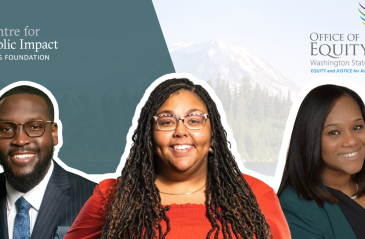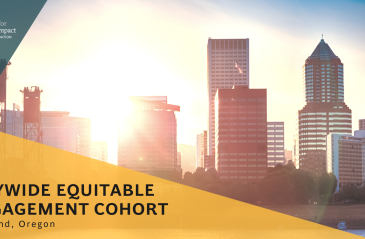
Five things we recently learned about difficult conversations

For elected officials, distrust is no secret. The question is what they do about it
Share articleWhat works for the best-managed companies, it turns out, also works well for government
Share articleGovernments can earn our trust if they focus on the citizen’s experience
Share articleWe put our vision for government into practice through learning partner projects that align with our values and help reimagine government so that it works for everyone.
Governments everywhere are suffering enormous pressures, but none is more fundamental than the erosion of citizens' trust in the people they elect. Americans are convinced that the United States lies at the centre of the crisis of trust. And in fact, trust in government to do what is right has plummeted to just 20% - and one recent survey found that the US Congress is less popular than head lice or colonoscopies.
Surveys from the OECD, however, show that the US government is trusted by just 30% of its citizens, between Japan (36%) and France (28%), higher than South Korea and Greece but lower than the UK (41%), Canada (62%) and the Scandinavian countries. Across the OECD, just 42% of citizens have confidence in their national governments. Distrust is epidemic, and that makes it hard for anyone to govern very well or for very long.
For elected officials, the problem of distrust is no secret. The question is what they can do about it. Most of the research suggests that the answer is discouraging: very little. Distrust builds on economic inequality. Every government leader is trying to reduce inequality, but they have few tools to do so in order to make progress during their terms of office - or to make changes stick in ways that citizens can see, appreciate, and reward at the polls.
Few public problems are more fundamental, more elusive, or more discouraging. And here's what's worse: when confronted with these challenges, elected officials are tempted to grab for quick wins that rarely work. That only feeds citizens' cynicism about the people they elect.
The problem is deeply rooted in what I call “wholesale trust”, the way that trust plays out at the broad, systemic levels of government. Wholesale distrust feeds off inequality, and it is extraordinarily hard to uproot.
But there's good news buried just out of sight. At what I call the level of “retain trust”, it is possible for government officials to improve the way government works - and for citizens to notice. These strategies build on the lessons taught by the customer experience movement in business, where analysts have found that companies improving the satisfaction of their customers reap higher profits.
What works for the best-managed companies, it turns out, also works well for government organisations. The agency in the US State Department that issues passports, for example, produced the second-biggest increase in customer experience of any organisation, public or private. It focused squarely on helping citizens get their passports more easily, and it paid off with stronger trust.
Even two much-maligned agencies, the Internal Revenue Service (IRS), which is charged with collecting income taxes, and Healthcare.gov, which was responsible for the website debacle at the launch of Barack Obama's new healthcare programme, vastly improved satisfaction in their services. The IRS created a mobile app which allowed taxpayers to check the status of their tax bill and any refund, and Healthcare.gov made it much easier for citizens to shop for healthcare plans and determine which physicians they could see. In fact, these programmes chalked up gains higher than at many private companies. They earned trust because they focused squarely on improving service to citizens.
Moreover, consider two clever experiments by researchers in Boston. In one study, they showed 554 citizens a five-minute video of city workers doing their job well, from building roads to ensuring food safety. Trust in government increased, because citizens saw the connection between good government workers and strong results. In another study, researchers tracked 21,786 citizens who used a mobile phone app to request a city service. Some citizens were shown photos of city workers actually working on their requests. Citizens were far more likely to continue using the app, because they could see the way government - and its workers - was serving them. Making the connection between what government workers did and the results they produced, in ways that were transparent to citizens, made a big difference.
So, it turns out that governments can earn our trust if they begin at the retail level and focus on the citizen's experience. That doesn't mean, of course, that retail improvements will easily translate into big changes in wholesale trust. That's a very big step for a very tough problem. And it might not mean that improvements in retail trust will necessarily translate into more votes for politicians.
But at a time when distrust is epidemic and despair over what to do about it is huge, the discovery that it's possible to move the needle - in a way that citizens will notice - is an enormous step towards solving a very difficult problem. And with luck, earning trust at the retail level can help build the foundation for citizen trust in the things they care about most.
What is legitimacy to you? Where do you see legitimacy working well? How governments work with citizens to build legitimacy is a big question for CPI.
Find out how to get involved in our Finding Legitimacy project
Check out Don's latest book Can Governments Earn Our Trust? (Polity Books)











